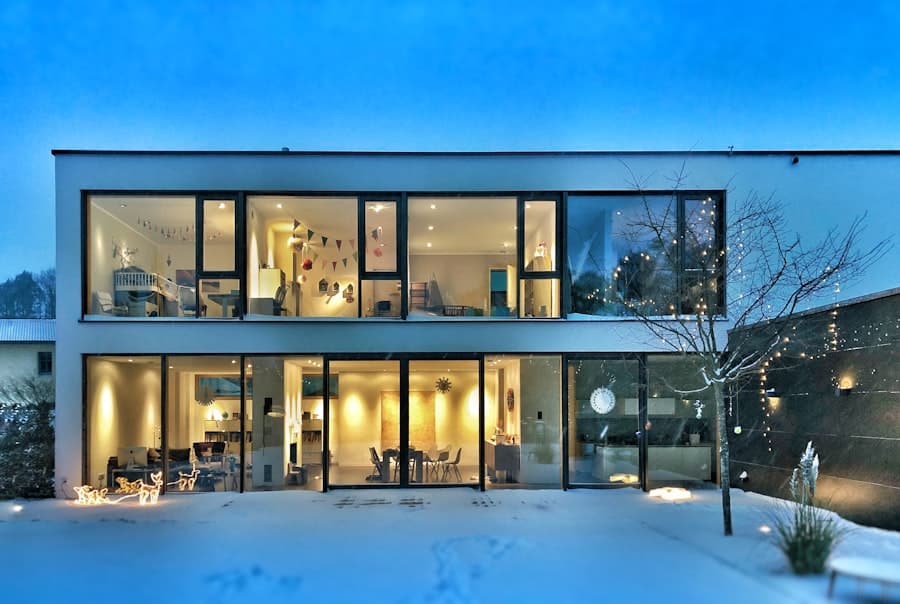As the global population ages, the demand for innovative solutions to support elderly care has surged. Smart home technology has emerged as a transformative force in this arena, offering a range of tools designed to enhance the quality of life for seniors while ensuring their safety and independence. These solutions leverage the Internet of Things (IoT) to create interconnected environments that can be tailored to meet the unique needs of older adults.
By integrating various devices and systems, smart home solutions can facilitate daily activities, monitor health conditions, and provide immediate assistance in emergencies. The concept of smart homes extends beyond mere convenience; it embodies a holistic approach to elderly care that prioritizes accessibility and autonomy. For many seniors, the ability to remain in their own homes while receiving the necessary support is paramount.
Smart home technologies can bridge the gap between independence and assistance, allowing older adults to live comfortably and securely in familiar surroundings. This article delves into the myriad benefits of smart home solutions for elderly care, exploring their applications in monitoring, health management, mobility, and social connectivity.
Key Takeaways
- Smart home solutions offer accessibility and convenience for elderly care, allowing seniors to live independently and safely in their own homes.
- The benefits of smart home solutions for elderly care include improved safety, health management, and social connectivity, leading to a better quality of life for seniors.
- Smart home technologies for monitoring and safety include motion sensors, video surveillance, and smart locks to ensure the security and well-being of elderly individuals.
- Smart home solutions for health management and medication reminders help seniors to stay on top of their health and medication schedules, promoting better overall well-being.
- Smart home solutions for mobility and independence include voice-activated devices, smart lighting, and automated home systems to assist seniors with daily tasks and improve their independence.
The Benefits of Smart Home Solutions for Elderly Care
Smart home solutions offer a plethora of benefits that significantly enhance the lives of elderly individuals. One of the most notable advantages is the increased safety they provide. With features such as smart security systems, motion sensors, and automated lighting, seniors can navigate their homes with greater confidence.
For instance, motion-activated lights can illuminate pathways during the night, reducing the risk of falls—a common concern among older adults. Additionally, smart doorbells equipped with cameras allow seniors to see who is at their door without having to physically approach it, thereby enhancing their sense of security. Another critical benefit is the promotion of independence.
Many elderly individuals cherish their autonomy and prefer to age in place rather than move to assisted living facilities. Smart home technologies empower them to manage daily tasks with minimal assistance. For example, voice-activated virtual assistants can help seniors control household appliances, adjust thermostats, or even make phone calls simply by using their voice.
This level of control not only fosters independence but also instills a sense of dignity and self-worth in older adults, allowing them to maintain their routines and preferences.
Smart Home Technologies for Monitoring and Safety

Monitoring technologies are at the forefront of smart home solutions for elderly care, providing families and caregivers with peace of mind while ensuring that seniors remain safe in their homes. One prominent example is the use of wearable devices that track vital signs such as heart rate, blood pressure, and activity levels. These devices can alert caregivers or family members if any readings fall outside of normal ranges, enabling timely intervention when necessary.
Furthermore, some wearables come equipped with fall detection features that automatically notify emergency services if a fall is detected. In addition to wearables, smart home systems can incorporate environmental sensors that monitor various conditions within the home. For instance, smoke detectors and carbon monoxide detectors can be integrated into a smart home network to send alerts directly to a caregiver’s smartphone if an emergency arises.
Similarly, water leak sensors can detect potential hazards before they escalate into significant issues, such as flooding or mold growth. By utilizing these technologies, families can ensure that their loved ones are not only safe but also able to live independently without constant supervision.
Smart Home Solutions for Health Management and Medication Reminders
Health management is another critical area where smart home solutions shine, particularly in assisting seniors with medication adherence. Many older adults take multiple medications daily, which can lead to confusion and missed doses. Smart pill dispensers are an innovative solution that can help mitigate this issue.
These devices can be programmed to dispense the correct dosage at specific times and send reminders via smartphone notifications or audible alerts when it’s time to take medication. Some advanced models even have built-in connectivity features that allow caregivers to monitor adherence remotely. In addition to medication management, smart home technologies can facilitate regular health check-ups through telehealth services.
Seniors can use smart devices equipped with cameras and microphones to consult with healthcare professionals from the comfort of their homes.
The integration of health management tools within smart home systems creates a comprehensive approach to elderly care that prioritizes both physical health and convenience.
Smart Home Solutions for Mobility and Independence
Mobility challenges are common among seniors, often leading to feelings of frustration and dependence on others for assistance. Smart home solutions can significantly enhance mobility within the home environment, allowing older adults to navigate their spaces more freely and safely.
Similarly, smart stairlifts can be installed to provide safe access between different levels of a home. Moreover, smart home technologies can be integrated with mobility aids such as robotic assistants or smart wheelchairs that help seniors move around their homes more easily. These devices can be programmed to respond to voice commands or mobile app instructions, allowing users to maintain control over their movements without relying on caregivers for every task.
By fostering an environment that supports mobility and independence, smart home solutions empower seniors to engage more fully in their daily lives while reducing feelings of isolation or helplessness.
The Role of Smart Home Solutions in Social Connectivity

Social connectivity is a vital aspect of mental well-being for seniors, yet many face challenges in maintaining relationships due to mobility issues or geographical distance from family members. Smart home solutions play a crucial role in bridging this gap by facilitating communication and interaction with loved ones. Video calling platforms integrated into smart devices allow seniors to connect visually with family members and friends, fostering a sense of closeness despite physical separation.
Additionally, social engagement can be enhanced through smart home technologies that promote participation in community activities or virtual events. For example, seniors can use smart speakers or displays to access online classes, workshops, or social gatherings tailored specifically for older adults. These platforms not only provide opportunities for learning and entertainment but also encourage social interaction among peers who may share similar interests or experiences.
By leveraging technology to enhance social connectivity, smart home solutions contribute significantly to the overall mental health and happiness of elderly individuals.
Considerations for Implementing Smart Home Solutions for Elderly Care
While the benefits of smart home solutions for elderly care are substantial, several considerations must be taken into account when implementing these technologies. One primary concern is the digital literacy of seniors; many older adults may not be familiar with using smartphones or other digital devices. Therefore, it is essential to choose user-friendly systems that offer intuitive interfaces and clear instructions.
Training sessions or ongoing support from family members or caregivers can also help ease the transition into using smart technologies. Another important factor is privacy and security. As smart home devices collect data about users’ habits and routines, there is a potential risk of unauthorized access or data breaches.
It is crucial for families to select reputable brands that prioritize data security and offer robust privacy settings. Additionally, educating seniors about safe online practices can empower them to protect their personal information while enjoying the benefits of smart home technology.
The Future of Smart Home Solutions in Elderly Care Accessibility
The future of smart home solutions in elderly care accessibility appears promising as technology continues to evolve at an unprecedented pace. Innovations such as artificial intelligence and machine learning are paving the way for even more sophisticated systems capable of anticipating the needs of seniors before they arise. As these technologies become more integrated into everyday life, they will likely play an increasingly vital role in supporting aging populations worldwide.
Moreover, as awareness grows regarding the importance of aging in place and maintaining independence among older adults, more resources will be allocated toward developing accessible smart home solutions tailored specifically for this demographic. The collaboration between technology developers, healthcare providers, and caregivers will be essential in creating comprehensive systems that address the multifaceted needs of seniors while ensuring their safety and well-being in an ever-changing world.
In a recent article on enicomp.com, the potential of sustainable energy is explored through the story of a founder who realized its importance. This article highlights the growing trend towards eco-friendly solutions in various industries, including smart home technology. Just as smart home solutions are enhancing elderly care accessibility, sustainable energy practices are also becoming more prevalent in our daily lives. Both of these advancements are shaping the future of technology and improving the quality of life for individuals of all ages.
FAQs
What are smart home solutions for elderly care accessibility?
Smart home solutions for elderly care accessibility are technological systems and devices designed to make it easier for elderly individuals to live independently and safely in their own homes. These solutions can include smart sensors, voice-activated assistants, medication reminders, and home monitoring systems.
How do smart home solutions enhance elderly care accessibility?
Smart home solutions enhance elderly care accessibility by providing assistance with daily tasks, monitoring for safety and security, and enabling remote communication with caregivers or healthcare professionals. These solutions can help elderly individuals maintain their independence and stay in their own homes for longer.
What are some examples of smart home solutions for elderly care accessibility?
Examples of smart home solutions for elderly care accessibility include smart door locks, automated lighting and temperature control, fall detection sensors, emergency call systems, and medication management devices. These solutions can be customized to meet the specific needs of individual elderly individuals.
Are smart home solutions for elderly care accessibility easy to use?
Many smart home solutions for elderly care accessibility are designed to be user-friendly and easy to use, with simple interfaces and voice-activated controls. Caregivers and family members can also assist in setting up and managing these systems to ensure that elderly individuals can use them effectively.
How do smart home solutions for elderly care accessibility benefit caregivers?
Smart home solutions for elderly care accessibility can benefit caregivers by providing peace of mind through remote monitoring and alerts, reducing the need for constant in-person supervision, and enabling easier communication with elderly individuals. These solutions can also help caregivers manage their time and resources more effectively.

